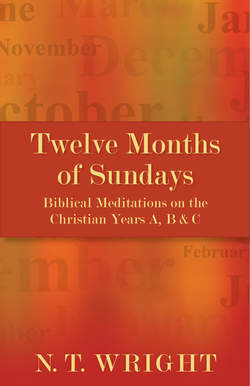Читать книгу Twelve Months of Sundays - N.T. Wright - Страница 51
На сайте Литреса книга снята с продажи.
ОглавлениеProper 10
Genesis 25.19–34
Romans 8.1–11
Matthew 13.1–9, 18–23
The next chapter of Genesis offers a striking echo to this parable: Isaac sowed seed, and reaped a hundredfold, for the Lord blessed him (26.12). But the key background, I think, is Isaiah 40.6–8 and 55.10–13. All flesh is grass, but God’s word will last. It will not return to him empty, but will accomplish his purpose, making the desert blossom like the rose.
The Sower, in other words, is not simply an earthly story with a heavenly meaning, a moral lesson about listening carefully (though it is that too; there are many Esaus in today’s Church, despising their birthright of hundredfold blessings through hearing and understanding the word). It is full of the music of the Kingdom, the new song of God after the long silence of the exile. It encapsulated Jesus’ challenge to his contemporaries to be Israel, because God was at last ‘sowing’ them again; and the warning that if this final word was not heeded the alternative would be catastrophe.
Note carefully what the lectionary’s omissions might lead us to ignore: the ‘interpretation’ is given to the disciples, not the crowds. This isn’t a ‘story with a moral’. It is a prophetic word. It performs that of which it speaks. You only say ‘If you have ears, then hear’ after something which is cryptic because, if stated explicitly, it would be explosive. Jesus’ hearers were presumably listening to him that day, benefiting from the natural acoustic properties of the Galilean shoreline, because they had already seen the Kingdom at work in what he was doing. Now he was telling them, in the only way possible, that this Kingdom was breaking into their world not simply to solve their problems, to endorse their agendas, but to do God’s strange work of judgement and mercy. They couldn’t take it for granted. They couldn’t hijack it for their own purposes. That’s dangerous talk.
Take this picture of Jesus as himself the sower, sowing God’s powerful word, and transpose it into the Pauline key. The Son of God is sent into the world to accomplish the Father’s will; and (an easy transition in Jewish thought) the word that goes forth to implement this work is the powerful breath of the Spirit. Romans 8, that most noble of Pauline passages, stresses here the new-Temple theme, another powerful image from Israel’s hope of restoration. The Spirit ‘indwells’ the people of God, as the Glory had dwelt in the wilderness tabernacle and the Jerusalem Temple.
Here, too, there are warnings against presumption, against the Esau-attitude of ‘those who have the mind of the flesh’. But here, supremely, is the promise of all promises. What the Torah could not do, God has done in Jesus’ death and the power of the Spirit. He has given life and peace. In a world of death and war, God’s human temples have an awesome responsibility. If you have ears, then hear. And if you have breath, then speak.
